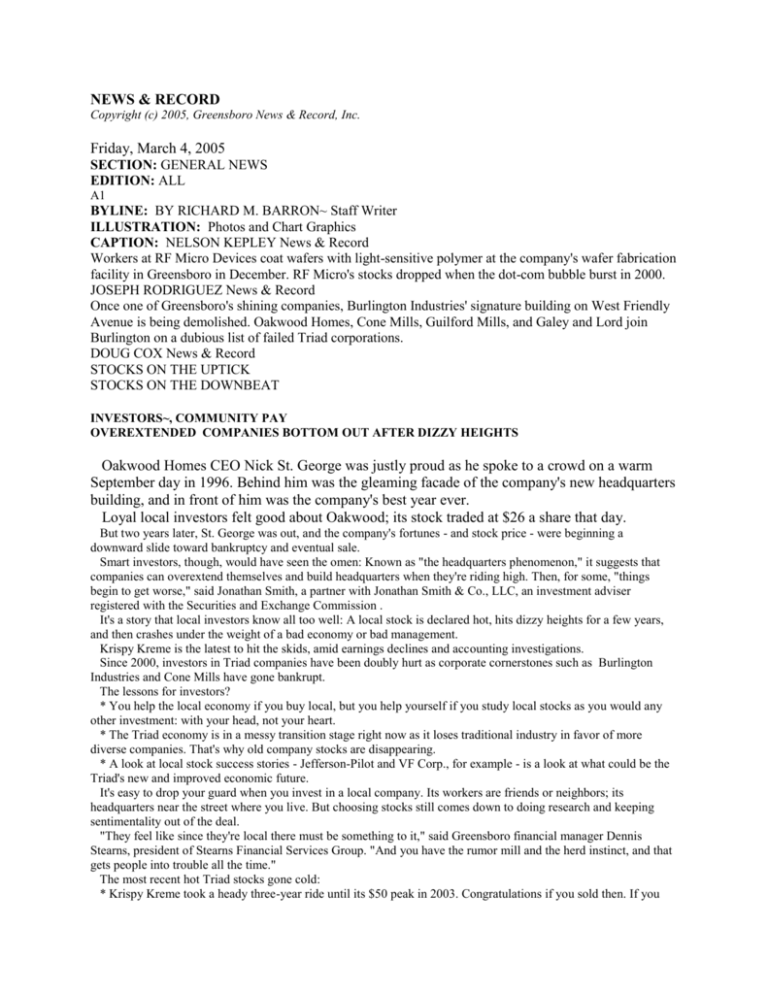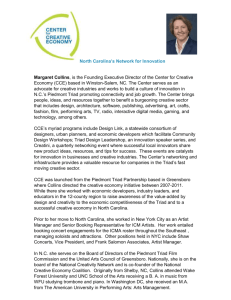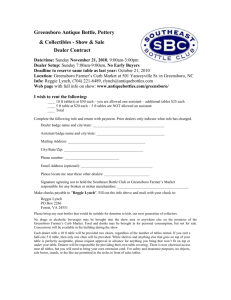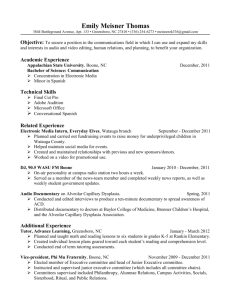news & record - Stearns Financial
advertisement

NEWS & RECORD Copyright (c) 2005, Greensboro News & Record, Inc. Friday, March 4, 2005 SECTION: GENERAL NEWS EDITION: ALL A1 BYLINE: BY RICHARD M. BARRON~ Staff Writer ILLUSTRATION: Photos and Chart Graphics CAPTION: NELSON KEPLEY News & Record Workers at RF Micro Devices coat wafers with light-sensitive polymer at the company's wafer fabrication facility in Greensboro in December. RF Micro's stocks dropped when the dot-com bubble burst in 2000. JOSEPH RODRIGUEZ News & Record Once one of Greensboro's shining companies, Burlington Industries' signature building on West Friendly Avenue is being demolished. Oakwood Homes, Cone Mills, Guilford Mills, and Galey and Lord join Burlington on a dubious list of failed Triad corporations. DOUG COX News & Record STOCKS ON THE UPTICK STOCKS ON THE DOWNBEAT INVESTORS~, COMMUNITY PAY OVEREXTENDED COMPANIES BOTTOM OUT AFTER DIZZY HEIGHTS Oakwood Homes CEO Nick St. George was justly proud as he spoke to a crowd on a warm September day in 1996. Behind him was the gleaming facade of the company's new headquarters building, and in front of him was the company's best year ever. Loyal local investors felt good about Oakwood; its stock traded at $26 a share that day. But two years later, St. George was out, and the company's fortunes - and stock price - were beginning a downward slide toward bankruptcy and eventual sale. Smart investors, though, would have seen the omen: Known as "the headquarters phenomenon," it suggests that companies can overextend themselves and build headquarters when they're riding high. Then, for some, "things begin to get worse," said Jonathan Smith, a partner with Jonathan Smith & Co., LLC, an investment adviser registered with the Securities and Exchange Commission . It's a story that local investors know all too well: A local stock is declared hot, hits dizzy heights for a few years, and then crashes under the weight of a bad economy or bad management. Krispy Kreme is the latest to hit the skids, amid earnings declines and accounting investigations. Since 2000, investors in Triad companies have been doubly hurt as corporate cornerstones such as Burlington Industries and Cone Mills have gone bankrupt. The lessons for investors? * You help the local economy if you buy local, but you help yourself if you study local stocks as you would any other investment: with your head, not your heart. * The Triad economy is in a messy transition stage right now as it loses traditional industry in favor of more diverse companies. That's why old company stocks are disappearing. * A look at local stock success stories - Jefferson-Pilot and VF Corp., for example - is a look at what could be the Triad's new and improved economic future. It's easy to drop your guard when you invest in a local company. Its workers are friends or neighbors; its headquarters near the street where you live. But choosing stocks still comes down to doing research and keeping sentimentality out of the deal. "They feel like since they're local there must be something to it," said Greensboro financial manager Dennis Stearns, president of Stearns Financial Services Group. "And you have the rumor mill and the herd instinct, and that gets people into trouble all the time." The most recent hot Triad stocks gone cold: * Krispy Kreme took a heady three-year ride until its $50 peak in 2003. Congratulations if you sold then. If you held on or, worse, bought the stock after that, you've seen it decline and now struggle at around $5 a share. * RF Micro Devices, which traded at nearly $90 a share five years ago, dropped when the dot-com bubble burst in 2000 and has traded between $5 and $10 a share for nearly three years. What about those Oakwood Homes investors who felt they had a bright future in 1996? On the day Oakwood declared bankruptcy in 2002, loyal shareholders who took the long ride down owned stock worth 50 cents a share. Stearns recommends that investors learn what leads to a failure before they judge the health of a company. RF Micro, for example, fell victim to the nationwide drop in the dot-com stocks, but the company is essentially sound. Krispy Kreme, on the other hand, "was an absolute failure of leadership," Stearns said. Its chief executive officer is now out, and if Krispy Kreme sticks to sound financial management, it is likely to recover despite negative news. Still, Stearns, Smith and others remind investors that there's no such thing as a sure-thing investment just because a company is local. "My firm has a number of clients in Northern California," Stearns said, "which is a hotbed of entrepreneurial spirit. And there's a natural ebb and flow there of companies that get big. Some fall on hard times. And there is an acceptance that just because it's down the block doesn't mean it's a good investment." That goes for even top executives of endangered companies. Miguel Rubiera, of Greensboro, was in charge of Cone Mills' international operations during the good times. He accumulated Cone stock in his 401(k) and had stock options as part of his pay. He left Cone four years ago, but he stayed with the stock too long. "But I got out before it went all the way to the ground," he said. Now a successful manager for the Americas operations of a large German textile firm, Rubiera knows his mistake was in trusting a broker who didn't know when to sell. "I lost hundreds of thousands of dollars in options. That doesn't bother me. That was a perk. If it didn't work out, it didn't work out," he said by telephone from a business trip in Nicaragua. Rubiera, now a client of Smith, is upset, though, for the hundreds of Cone retirees who lost their 401(k) retirement money when the company failed. "The people that have worked all their lives for the company - those are the ones I feel really, really sorry for," he said. Beyond damaged investors, the Triad is hurt in other, less tangible ways when companies fail. Every time a company disappears, another chance for good national publicity is gone, said Greensboro financial planner John Rosser of Consolidated Planning Inc. Every earnings report that has a Greensboro dateline means another boost. It's like ACC basketball tournaments: "How many times have we watched something on TV from our Greensboro Coliseum, and millions or hundreds of millions of people know where Greensboro is? It's the same thing when we lose publicly traded companies whose dateline is Greensboro, North Carolina." In addition, Rosser and others agree that local foundations, charities and community institutions suffer when the local profits drain to other regions as the Triad becomes a "back office" community with few strong corporate headquarters. Greensboro and the Triad, though, are changing in ways that should improve the prospects for local companies and investors. The FedEx package-sorting hub that's being built at Piedmont Triad International Airport should be the catalyst for more transportation companies moving to the area, Rosser said. Transportation businesses have long been seen as the Triad's best future. Stearns said that as a greater variety of companies spring up, the Triad will get stronger. Rosser notes that two local companies with strong stock prices and earnings power - VF Corp. and Jefferson-Pilot - are essentially marketing, accounting and distribution driven companies. Brick and mortar factories are heading to other countries. Management expertise will be a powerful asset for the Triad in the future, he says. Finally, will all those deflated paper millionaires who own Krispy Kreme and RF Micro stock be a permanent drag on the local economy? Stearns says that more and more wealthy people from other places are choosing to live in the Piedmont Triad because they like the climate, the culture and the lifestyle. And a wider variety of affluent people helps the entire community, Stearns said. "You have got to have diversification as a community, and Silicon Valley learned that lesson the hard way." Contact Richard M. Barron at 373-7371 or dbarron@news-record.com PAGE: A1 bulgin 0503040236






